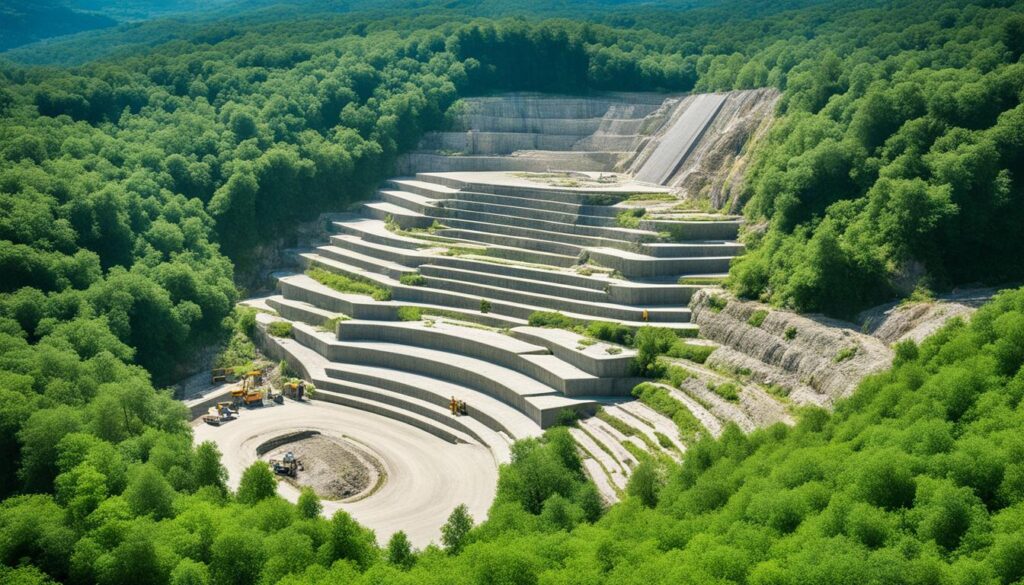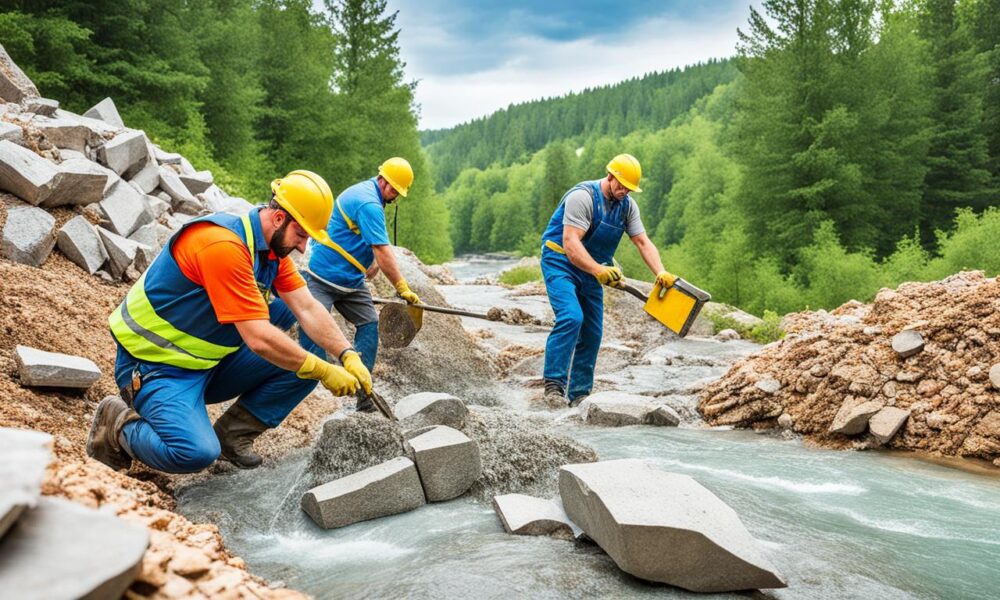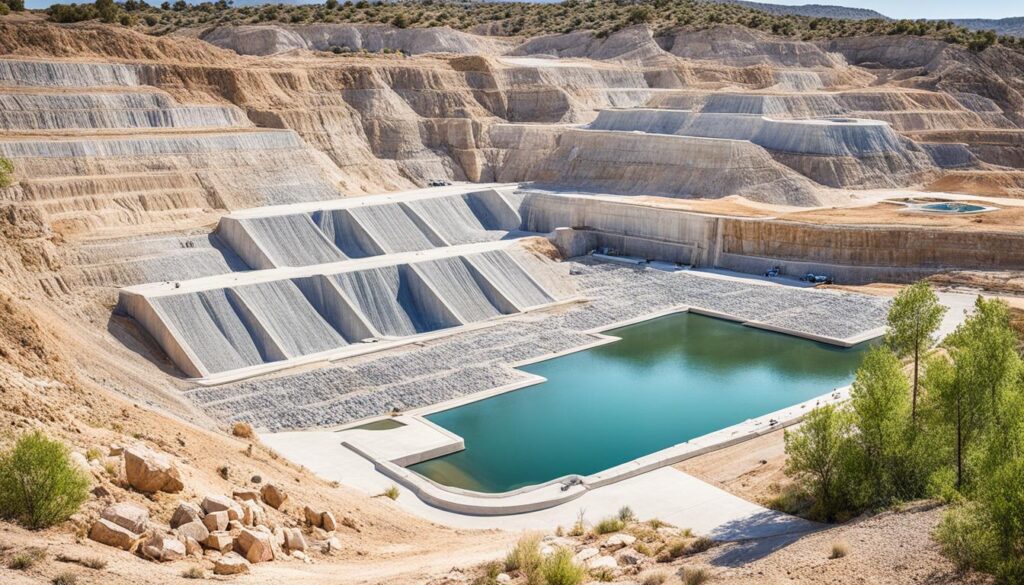Natural Stone Ethics: Sustainability in Quarrying
Natural stone is a timeless and beautiful building material that offers numerous benefits to both the environment and the built environment. From its durability and low maintenance requirements to its aesthetic appeal, natural stone is a popular choice for architects, designers, and homeowners alike. However, it is essential to consider the ethical and sustainable practices involved in sourcing natural stone to ensure its environmental and social impact is minimized.
When it comes to natural stone ethics, sustainable sourcing is a key consideration. By sourcing stone from quarries that prioritize responsible practices, we can ensure that the extraction and production processes have minimal negative effects on the environment and surrounding communities. This includes implementing measures to reduce energy consumption, water usage, and waste generation.
Additionally, sustainable stone sourcing involves choosing stone materials from regions where they are locally abundant. By minimizing transportation distances, we can reduce carbon emissions and support the local economy.
Certifications and resources such as the ANSI/NSC 373 standards and LEED v4 Certification provide guidance and assurance when it comes to sustainable stone sourcing. These certifications help architects and owners make informed decisions and ensure that the stone used in their projects aligns with green building practices.
Key Takeaways:
- Natural stone offers numerous benefits in terms of durability, low maintenance, and aesthetic appeal.
- Sustainable sourcing is crucial to minimize the environmental and social impact of natural stone.
- Sustainable stone sourcing involves responsible quarrying practices, reducing energy consumption, water usage, and waste generation.
- Choosing locally abundant stone materials reduces transportation distances and carbon emissions.
- Certifications like ANSI/NSC 373 and LEED v4 provide guidance and assurance in sustainable stone sourcing.
The Benefits of Natural Stone in Green Building
Natural stone is a green building material that offers numerous benefits. Its inherent characteristics make it an environmentally friendly choice for construction projects. Here are some key advantages of using natural stone in green building:
Durability and Longevity
One of the prominent benefits of natural stone is its exceptional durability. Stone has been used in construction for centuries, standing the test of time. Unlike other materials that may degrade over time, natural stone retains its structural integrity for generations. This longevity reduces the need for frequent replacements, minimizing waste output and conserving resources.
Minimal Environmental Impact
Natural stone has a minimal impact on the environment. As a single-ingredient material, it does not require excessive processing or additives. The extraction and production processes for natural stone are relatively simple, resulting in lower energy consumption and carbon emissions compared to other building materials. In addition, stone is locally available in many markets, reducing the carbon footprint associated with transportation.
Healthy Indoor Air Quality
Unlike some synthetic materials, natural stone does not release volatile organic compounds (VOCs) into the air. VOCs can contribute to poor indoor air quality and have harmful effects on human health. By choosing natural stone, builders can create healthier indoor environments for occupants.
Visual Appeal and Aesthetic Versatility
Natural stone is renowned for its timeless beauty and aesthetic versatility. It comes in a wide range of colors, textures, and patterns, allowing architects and designers to create unique and visually striking structures. The natural variations in stone add character and charm to any building, making it an ideal choice for both contemporary and traditional designs.
Resistance to Weathering and Fire
Another advantage of natural stone is its resistance to weathering and fire. Stone is inherently resilient, capable of withstanding harsh environmental conditions and extreme temperatures. This durability provides added protection for buildings, enhancing their longevity and safety.
Overall, the use of natural stone in green building promotes sustainability and responsible construction practices. Its durability, minimal impact on the environment, healthy indoor air quality, aesthetic versatility, and resistance to weathering and fire make natural stone a preferred choice for eco-conscious builders and designers.
| BENEFITS | DESCRIPTION |
|---|---|
| Durability and Longevity | Exceptional durability, long-lasting material |
| Minimal Environmental Impact | Low energy consumption, locally available |
| Healthy Indoor Air Quality | No release of harmful VOCs |
| Visual Appeal and Aesthetic Versatility | Wide range of colors, textures, and patterns |
| Resistance to Weathering and Fire | Highly resilient, withstands harsh conditions |
Sustainability in Natural Stone Production
The sustainability of natural stone production is reliant on a combination of factors, including ethical mining practices, responsible production, and eco-friendly stone extraction. These considerations aim to minimize the environmental impact of quarrying operations, manufacturing processes, and supply chain activities. By adopting these practices, the natural stone industry can prioritize the preservation of land and ecosystems, while also ensuring social responsibility.
Responsible sourcing is a key aspect of sustainability in natural stone production. It entails extracting stone in an environmentally friendly manner, with a focus on minimizing the disruption to ecosystems and land. This includes conducting thorough environmental impact assessments, implementing reclamation plans for quarries, and adhering to strict regulations for waste management and emissions control.
In addition to environmentally responsible practices, the natural stone industry also places importance on ethical labor practices and social responsibility. This involves ensuring fair treatment and safe working conditions for workers, promoting diversity and inclusion, and supporting local communities in proximity to quarry sites.
To further enhance sustainable practices and provide transparency in the industry, certifications such as the ANSI/NSC 373 standards have been established. These certifications address various aspects of sustainability, including responsible sourcing, water usage, waste management, and social accountability. By adhering to these standards, the natural stone industry can improve its environmental performance, promote responsible production, and provide valuable information on manufacturing and sourcing practices to consumers.
Industry Commitment to Ethical and Eco-Friendly Practices
“We are committed to ethically sourcing our natural stone and ensuring that our production processes have a minimal impact on the environment. Through responsible quarrying practices, we strive to preserve the natural beauty of the land and protect the ecosystems around us.”
Companies within the natural stone industry, such as XYZ Natural Stone Company, are placing a greater emphasis on sustainability and responsible production. They invest in technologies and processes that minimize energy consumption, reduce waste, and prioritize water conservation. By adhering to ethical mining practices and supporting eco-friendly stone extraction, these companies demonstrate their commitment to preserving the environment and creating a more sustainable future for the industry.
Key Takeaways
- Ethical mining practices and responsible production are essential for sustainable natural stone production.
- Responsible sourcing ensures environmentally friendly stone extraction with minimal impact on land and ecosystems.
- Ethical labor practices and social responsibility are important considerations in the industry.
- Certifications, such as the ANSI/NSC 373 standards, improve the environmental performance of the natural stone industry and provide transparency in manufacturing and sourcing practices.
Reclamation and Recycling in the Natural Stone Industry
Natural stone quarries play an integral role in the construction industry, providing essential materials for building projects. However, the responsible management of these quarries is equally vital to ensure the long-term sustainability of the stone industry. Reclamation and recycling initiatives are key components of sustainable quarrying practices, addressing concerns such as land restoration and waste reduction.
Once a quarry reaches the end of its lifespan, it is crucial to reclaim the land to its original state or repurpose it for other beneficial uses. This process involves carefully restoring the terrain, reintroducing native vegetation, and mitigating any environmental impacts. Through reclamation efforts, the former quarry areas can be transformed into valuable ecosystems or repurposed for recreational purposes, such as parks or natural reserves.
But reclamation is just one aspect of sustainable quarrying. To minimize excess material and reduce waste, natural stone manufacturers like Polycor implement recycling programs to repurpose unused or leftover stone. One such example is the recycling of excess stone into gravel, which can be used for various construction applications, including road and pathway surfacing.
Polycor, a leading natural stone manufacturer, spearheads these efforts by incorporating reclamation plans into their quarry management practices. By reclaiming and rehabilitating their quarries, they ensure that the land is restored and can be safely reintegrated into the surrounding environment.
Beyond reclamation, Polycor also focuses on recycling stone to reduce waste. An excellent example of this is their partnership with Vetrazzo, a manufacturer of environmentally friendly recycled glass countertops. Polycor aggregates the excess stone from their quarrying operations, which Vetrazzo then incorporates into their recycled glass products. This closed-loop approach promotes a circular economy by extending the lifecycle of natural stone and reducing the need for virgin materials.
Benefits of Reclamation and Recycling in the Natural Stone Industry
The reclamation and recycling efforts in the natural stone industry yield several significant benefits:
- Environmental Preservation: Reclaiming quarries helps restore the natural landscape, ensuring the conservation of biodiversity and ecosystem services. By repurposing unused stone, the industry minimizes its environmental footprint and reduces the need for additional extraction.
- Waste Reduction: Recycling excess stone into useful products reduces waste generation and promotes a more sustainable approach to resource utilization. It also minimizes the environmental impacts associated with waste disposal.
- Cost Efficiency: Reclaiming quarries and recycling stone can lead to cost savings for natural stone manufacturers. By repurposing excess material, they can reduce their dependence on new extraction, resulting in fewer expenses related to quarrying and processing.
- Social Responsibility: The reclamation and recycling efforts demonstrate the commitment of natural stone manufacturers to responsible practices, contributing to overall social and environmental sustainability.
By implementing reclamation plans and recycling programs, the natural stone industry takes significant strides towards reducing its environmental impact and promoting the responsible use of resources. Through the efforts of manufacturers like Polycor, the industry demonstrates its commitment to sustainability and contributes to the circular economy.
| Benefits of Reclamation and Recycling | |
|---|---|
| Environmental Preservation | 🌿 |
| Waste Reduction | ♻️ |
| Cost Efficiency | 💰 |
| Social Responsibility | 🤝 |
The Role of Certifications in Sustainable Stone Sourcing
Certifications, such as LEED v4 Certification, play a crucial role in ensuring the sustainability and environmental performance of stone sourcing. These certifications encourage transparency in raw material sourcing, land use practices, and labor conditions. Natural stone quarriers and fabricators that meet the standards set by these certifications demonstrate their commitment to economic, environmental, and social responsibility.
“Certifications provide assurance to architects and owners that the stone used in their projects is sustainable.”
Third-party verified certifications, like those offered by the Natural Stone Council, provide assurance to architects and owners that the stone used in their projects is sustainable. These certifications involve rigorous audits and assessments to ensure compliance with sustainable stone sourcing principles.
One of the notable certifications in the green building industry is LEED v4 Certification. This certification recognizes the efforts of stone suppliers and manufacturers who adopt sustainable practices, contributing to energy efficiency, reduced environmental impact, and healthier indoor spaces.
By specifying natural stone products with LEED v4 Certification, architects can earn points towards their project’s sustainability goals. The certification also helps architects and owners make informed decisions about their material selection, ensuring that the stone used in their projects meets the highest standards of environmental responsibility.
The Natural Stone Council, a collaboration of natural stone organizations, offers various certifications that promote sustainable stone sourcing and responsible production practices. These certifications include the ANSI/NSC 373 Standard for Sustainable Production of Natural Dimension Stone, which provides a clear framework for evaluating and documenting the environmental performance of stone production.
LEED v4 Certification Criteria for Stone
The LEED v4 Certification program evaluates the environmental impact of stone sourcing based on several criteria, including:
- Materials extraction and manufacturing
- Transportation of raw materials
- Supply chain transparency
- Social responsibility
Stone suppliers and manufacturers must meet these criteria to achieve LEED v4 Certification. The certification process involves an extensive review of documentation and verification of compliance with the standards.
| LEED v4 Certification Criteria | Description |
|---|---|
| Materials Extraction and Manufacturing | Evaluation of the environmental impact of stone extraction and manufacturing processes, considering factors such as energy consumption, water usage, and air emissions. |
| Transportation of Raw Materials | Assessment of the carbon footprint associated with the transportation of stone from the quarry to the manufacturing facility. |
| Supply Chain Transparency | Ensuring that the stone supplier provides detailed information about the origin of the stone, including the quarry location and responsible extraction practices. |
| Social Responsibility | Verification of ethical labor practices throughout the supply chain, including fair wages and safe working conditions for stone workers. |
By adhering to these criteria, stone suppliers and manufacturers contribute to a more sustainable built environment and support the principles of sustainable stone sourcing.

The Sustainable Practices of Polycor
Polycor, one of the largest natural stone manufacturers in North America, is committed to sustainable practices and responsible sourcing. The company owns quarries and manufacturing facilities, allowing for complete control over the supply chain and ensuring high standards of quality and practice.
Polycor’s stones, including marble, granite, limestone, and soapstone, are all sourced from their own quarries and processed in their own facilities. This clear chain of custody guarantees that the stones are ethically and sustainably extracted, with minimal impact on the environment.
In addition to their commitment to sustainable practices, Polycor prioritizes the health and safety of its workers. The company adheres to strict labor regulations and promotes a safe working environment. By maintaining ethical labor practices, Polycor ensures that their natural stone products are not only environmentally friendly but also socially responsible.
Furthermore, Polycor’s dedication to good corporate governance is evident in their continuous efforts to improve the industry as a whole. They actively seek out innovative solutions to reduce their environmental footprint, enhance their manufacturing processes, and invest in sustainable technologies.
| Polycor’s Sustainable Practices | Benefits |
|---|---|
| Possession of quarries and manufacturing facilities | Allows complete control over the supply chain and ensures high standards of quality and practice |
| Clear chain of custody | Guarantees ethically and sustainably extracted stones with minimal environmental impact |
| Prioritization of worker health and safety | Adherence to strict labor regulations and promotion of a safe working environment |
| Commitment to good corporate governance | Ongoing efforts to improve the industry, reduce environmental footprint, and invest in sustainable technologies |
By choosing Polycor as a partner, architects, designers, and consumers can be confident in the sustainability and quality of their natural stone products. Polycor’s practices reflect their dedication to preserving the environment, supporting responsible sourcing, and contributing to a more sustainable future.
The Environmental Benefits of Natural Stone
Natural stone offers numerous environmental benefits that contribute to the overall sustainability of the stone industry. From water conservation to recycling, the use of natural stone in construction and design promotes eco-friendly practices and reduces waste.
Water Conservation
One of the significant environmental advantages of natural stone is its low water consumption throughout its life cycle. Unlike other building materials that may require constant watering or maintenance, natural stone requires minimal watering, saving a significant amount of water resources. This makes it an ideal choice for areas with limited water supply or regions that prioritize water conservation.
Recycling
The recycling of materials is an essential aspect of sustainability in any industry, and the natural stone industry is no exception. Excess stone generated during the extraction process is recycled into gravel for various applications. This helps to minimize waste and reduces the need for additional raw materials. By repurposing the excess stone, the natural stone industry promotes a circular economy and reduces its environmental footprint.
| Environmental Benefit | Description |
|---|---|
| Low water consumption | Natural stone requires minimal watering throughout its life cycle, promoting water conservation. |
| Recycling | Excess stone generated during extraction is recycled into gravel, reducing waste and promoting a circular economy. |
Polycor, a leading natural stone manufacturer, is committed to sustainable practices and water conservation. The company implements water recycling processes in their production facilities, further reducing their environmental impact and conserving water resources.
By responsibly sourcing natural stone and implementing recycling measures, the stone industry is making significant strides towards a more sustainable future. These practices not only benefit the environment but also contribute to the overall social responsibility of the industry.
The environmental benefits of natural stone, such as water conservation and recycling, make it a preferred choice for architects, designers, and homeowners who value sustainable materials and practices.
The Role of Natural Stone in Green Architecture
Natural stone is a timeless and iconic building material that has been widely used in green architecture. Its durability, low maintenance requirements, and aesthetic appeal make it a popular choice for both restoration projects and modern architecture.
Designers and architects can specify certified natural stone to meet the sustainability goals of their projects and earn credits in green building programs, such as LEED v4 Certification.
Take a look at some of the sustainable stones offered by Polycor, including granite, marble, limestone, and soapstone:
- Granite: With its strong composition and resistance to wear and tear, granite is a durable and eco-friendly choice for countertops, floors, and facades.
- Marble: Known for its elegant appearance, marble is a versatile and sustainable stone that adds a touch of luxury to any architectural design.
- Limestone: Limestone is a natural stone that is sustainable, versatile, and available in various colors and textures. It is commonly used for wall cladding, flooring, and paving.
- Soapstone: Soapstone is a high-density and low-porosity stone that is resistant to heat, stains, and chemicals. It is a sustainable choice for kitchen countertops and sinks.
By incorporating natural stone into their projects, architects and designers not only enhance the visual appeal of their designs but also contribute to a more sustainable built environment. The use of natural stone in green architecture exemplifies the harmony between aesthetics, durability, and environmental responsibility.
The Beauty of Natural Stone
“Natural stone offers unmatched beauty and elegance, making it a favorite among architects and designers who value aesthetics and timeless appeal.”
Conclusion
Ensuring natural stone ethics and sustainable stone sourcing principles is essential in minimizing the environmental impact of the stone industry and promoting responsible practices. Companies like Polycor are leading the way in providing ethically sourced and environmentally friendly natural stone products. With clear chain-of-custody ownership and a strong commitment to sustainability, Polycor sets a high standard for the industry.
Designers and architects play a crucial role in promoting a more eco-friendly and socially responsible built environment. By confidently specifying certified natural stone, they can contribute to their sustainability goals. Certified natural stone helps support natural stone ethics and ensures that building projects align with green building practices.
By embracing the use of natural stone, and choosing sustainably sourced materials, the construction industry can enhance the overall environmental performance of buildings. Polycor and other companies in the stone industry are dedicated to providing high-quality natural stone products while prioritizing sustainability and responsible practices.




